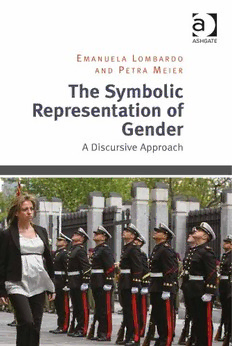
The symbolic representation of gender: a discursive approach PDF
Preview The symbolic representation of gender: a discursive approach
The Symbolic RepReSenTaTion of GendeR To our families, Myra, Florian, Timon, Eduardo, Nicolas, Adriana, and Franco The Symbolic Representation of Gender a discursive approach emanuela lombaRdo Complutense University of Madrid, Spain peTRa meieR University of Antwerp, Belgium © emanuela lombardo and petra meier 2014 all rights reserved. no part of this publication may be reproduced, stored in a retrieval system or transmitted in any form or by any means, electronic, mechanical, photocopying, recording or otherwise without the prior permission of the publisher. emanuela lombardo and petra meier have asserted their right under the copyright, designs and Patents Act, 1988, to be identified as the authors of this work. published by ashgate publishing limited ashgate publishing company Wey court east 110 cherry Street union Road Suite 3-1 farnham burlington, VT 05401-3818 Surrey, Gu9 7pT uSa england www.ashgate.com British Library Cataloguing in Publication Data A catalogue record for this book is available from the British Library The Library of Congress has cataloged the printed edition as follows: lombardo, emanuela. The symbolic representation of gender : a discursive approach / by emanuela lombardo and petra meier. pages cm includes bibliographical references and index. ISBN 978-1-4094-3236-4 (hardback) – ISBN 978-1-4094-3237-1 (ebook) – ISBN 978-1-4724-0325-4 (epub) 1. Sex role. 2. Signs and symbols. I. Meier, Petra. ii. Title. hQ1075.l657 2014 305.3–dc23 2013050270 ISBN 9781409432364 (hbk) ISBN 9781409432371 (ebk – PDF) ISBN 9781472403254 (ebk – ePUB) III printed in the united Kingdom by henry ling limited, at the dorset press, dorchester, dT1 1hd Contents List of Figures, Tables and Annexes vii About the Authors ix Acknowledgements xi List of Abbreviations xiii 1 The Symbolic Representation of Gender: An Introduction 1 2 Theorising Symbolic Representation 19 3 A Discursive Approach to Symbolic Representation 39 4 Symbolic Representation and the Construction of Identity 55 5 Symbolic Representation and Legitimacy 73 6 Symbolic Representation and Political Control 97 7 The Relation between Descriptive and Symbolic Representation 119 8 The Relation between Substantive and Symbolic Representation 139 9 Power at Work in the Symbolic Representation of Gender 155 10 Conclusions 175 Bibliography 185 Index 203 This page has been left blank intentionally List of Figures, Tables and Annexes Figures 1.1 Defence Minister Carme Chacón inspecting the troops, Spain 1 1.2 Campaign ‘Different families, same love’ 10 1.3 Campaign ‘Different families, same love’ 13 2.1 Marianne 19 2.2 Zeus and Europa, Léon de Pas, Brussels 21 Tables 2.1 The focus on content and form in descriptive, substantive and symbolic representation 28 4.1 Code occurrence of the social role of actors in EU policy texts on non-employment 61 7.1 Overview of Belgian gender quota laws 127 9.1 Concepts of power in the functions of symbolic representation 163 9.2 Concepts of power in the dimensions of political representation 168 Annexes 3.1 Supertext template 52 4.1 List of EU documents on ‘non employment’ analysed 71 5.1 List of Belgian and Italian documents on intimate citizenship analysed 92 6.1 List of Italian and Spanish documents on gender-based violence analysed 114 7.1 List of documents on Belgian gender quota laws analysed 138 This page has been left blank intentionally About the Authors Emanuela Lombardo, PhD in Politics at the University of Reading (UK), is Lecturer at the Department of Political Science and Administration II of Madrid Complutense University (Spain). Her research interests concern gender equality policies and intersectionality, particularly in the European Union and Spain, political representation and gender, Europeanisation of gender equality policies, and feminist political theory. On these issues she has published articles in journals such as Comparative European Politics, Political Science, Social Politics, European Journal of Women’s Studies, Feminist Review, Journal of Women Politics and Policy, Women’s Studies International Forum, International Feminist Journal of Politics, Citizenship Studies, as well as chapters in edited volumes. Her most recent publications are The Europeanization of Gender Equality Policies, co- edited with Maxime Forest (Palgrave 2012) and The Discursive Politics of Gender Equality, co-edited with Petra Meier and Mieke Verloo (Routledge 2009). For further information see http://www.ucm.es/info/target/ Petra Meier is Associate Professor at the Department of Political Science and Director of the Policy Research Centre on Equality Policies at the University of Antwerp (Belgium). Her major research interests are the representation of gender and sexuality in politics and policies, the consequences of these representations, and the means to tackle inequalities stemming from them. She studies theories on representation, the normative foundations and consequences of electoral systems, gender quota, feminist approaches to public policies, gender equality policies, and, more recently, the challenges multi-level settings and especially federal systems pose to such issues. She has (co-)edited several volumes, including a special issue on gender for Publius: The Journal of Federalism (with Jill Vickers and Louise Chappell, 2013), Au-delà et en-deçà de l’Etat: le genre entre dynamiques transnationales et multi-niveaux (Beyond and Within the State: Gender Between Transnational Dynamics and Multiple Levels; with Bérengère Marques Pereira and David Paternotte, Academia Bruylant 2010), Gezien, gehoord, vertegenwoordigd? Diversiteit in de Belgische politiek (Seen, heard, represented? Diversity in Belgian politics; with Karen Celis and Bram Wauters, Academia Press 2010), and publishes regularly in journals and edited volumes.
